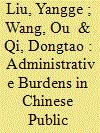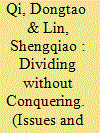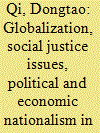|
|
|
Sort Order |
|
|
|
Items / Page
|
|
|
|
|
|
|
| Srl | Item |
| 1 |
ID:
192630


|
|
|
|
|
| Summary/Abstract |
The non-take-up of public services has the potential to undermine civil rights and deepen social inequality. Looking at the case of the Youth Community College Programme in China, an innovation in governance to facilitate community integration of the migrant population by providing free education, this study finds that the targeted disadvantaged groups are systematically excluded due to the disproportionate imposition of various administrative burdens on them. We propose that an interaction mechanism – which we term “selective affinity” – between the policy process and individuals’ human capital leads to this unintended outcome. The study contributes to a deeper understanding of the causal mechanisms underlying vulnerable people's non-take-up of public services, while highlighting an example of dysfunctional state–society interaction and a mechanism for the reproduction of social inequality under authoritarianism in China.
|
|
|
|
|
|
|
|
|
|
|
|
|
|
|
|
| 2 |
ID:
181399


|
|
|
|
|
| Summary/Abstract |
Based on the literature about the role of rising nationalism in recent world politics, this paper proposes a nationalism-oriented causal model to explain the voting choices of different social groups. With an interest-identity framework, this generic model is applied to Taiwan’s 2016 presidential election to examine whether and to what extent 11 causal mechanisms influence the voting choices of four groups defined by generation, class, and ethnicity. The findings not only reveal generational, class-based, and ethnic differences in Taiwanese voting behavior; they also show that the election was largely one of identity politics centered around the issues of national identity and democratic identification, making the “interest card” played by Beijing less effective in swaying voter choices. This explains why Beijing’s divide-and-conquer economic policy successfully divided Taiwanese voters but failed in the end to prevent the pro-independence candidate from winning the election. The findings also indicate that the economic concerns of voters promoted both their Taiwanese identity and support for Taiwan independence, while identification with Taiwan’s democracy contributed directly to the former and only indirectly to the latter. Overall, the model presents a more fine-grained analysis of nationalist politics and may be applied to the studies of other political behaviors involving nationalism.
|
|
|
|
|
|
|
|
|
|
|
|
|
|
|
|
| 3 |
ID:
124897


|
|
|
|
|
| Publication |
2013.
|
| Summary/Abstract |
Taking a broader perspective to explore the relations between Taiwan's globalization, social justice issues and the DPP's political and economic nationalism, this study aims to understand the DPP's resurgence in local elections since 2008, and its defeat in the 2012 presidential election. Increasing capital flight from Taiwan to mainland China has contributed to Taiwan's rising unemployment and income inequality. Less privileged Taiwanese, having stronger nationalist sentiments and concerns about the Taiwanese government's open-door China policy, switched their support from the KMT to the DPP during the DPP administration of 2000-2008. Since 2008, the DPP's better balance between its political and economic nationalism has been instrumental in securing popular support, especially at the local level. Nevertheless, in the 2012 presidential election, the DPP failed to convince the majority of Taiwanese voters that its moderate political nationalism could maintain the significantly improved cross-Strait relations vital for Taiwan's economic revival under the current bleak world economic conditions.
|
|
|
|
|
|
|
|
|
|
|
|
|
|
|
|
| 4 |
ID:
192117


|
|
|
|
|
| Summary/Abstract |
Based on a nine-city cell phone survey in 2019, this paper systematically examines which groups showed stronger support for armed unification with Taiwan and what factors and mechanisms might contribute to their support. The bivariate analysis shows the politically, economically, and socially privileged groups and those with stronger national pride and more understanding of Taiwan were more pro-armed unification, while residents of the two coastal cities, Xiamen and Guangzhou, were less supportive. Further analysis indicates education and unfavorable view of the Taiwanese government were the two most powerful factors contributing to the support. Possible contributing mechanisms might include both top-down mechanisms, such as political indoctrination and propaganda, and bottom-up ones, such as the respondents’ interest and identity considerations influenced by their city’s proximity to Taiwan.
|
|
|
|
|
|
|
|
|
|
|
|
|
|
|
|
|
|
|
|
|